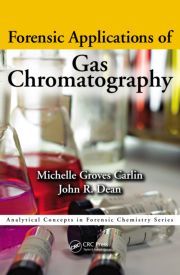
Forensic Applications of Gas Chromatography - Groves / Dean

Descripción
Descripción completa de: Forensic Applications of Gas Chromatography - Groves / Dean
Author: Michelle Groves Carlin, John Richard Dean
Language: English
Finishing: Paperback, 186 pages
ISBN: 978-1-4665-0754-8
Edition Number: June 2013
Author information:
Michelle Groves Carlin, MSc, BSc (Hons), MRSC, CChem, studied at Heriot-Watt University in the honors program in color chemistry. She then worked at a dyehouse in the Scottish Borders before embarking on a career in analytical chemistry. After some time spent in a contract research organization in Edinburgh, she continued her education with an MSc in forensic science from Strathclyde University. She carried out a research project in the toxicology department of the Institut de Recherche Criminelle de la Gendarmerie Nationale (IRCGN) in Paris using LC-ESI-MS. She then became the manager of a workplace drug-testing laboratory in the north east of England before taking on a teaching position as lecturer in forensic science at Teesside University, where she spent three years. In 2009, she moved to Northumbria University as a senior lecturer in forensic chemistry, where she carries out research in analytical toxicology.
John R. Dean, DSc, PhD, DIC, MSc, BSc, FRSC, CChem, CSci, Cert. Ed., took his first degree in Chemistry at the University of Manchester Institute of Science and Technology (UMIST), followed by an M.Sc. in Analytical Chemistry and Instrumentation at Loughborough University of Technology and finally a Ph.D. and D.I.C. in Physical Chemistry at Imperial College of Science and Technology, London. He then spent two years as a postdoctoral research fellow at the Food Science Laboratory of the Ministry of Agriculture, Fisheries and Food in Norwich in conjunction with Polytechnic South West in Plymouth. This was followed by a temporary lectureship in Inorganic Chemistry at Huddersfield Polytechnic. In 1988 he was appointed to a lectureship in Inorganic/Analytical Chemistry at Newcastle Polytechnic (now Northumbria University). This was followed by promotion to Senior Lecturer (1990), Reader (1994), Principal Lecturer (1998) and Associate Dean (Research) (2004). In 2004 he was appointed as Professor of Analytical and Environmental Science. Since 2008 he has held dual responsibility as Head of the Graduate School and Research Professor in the Department of Applied Sciences. In 1998 he was awarded a D.Sc. (London) in Analytical and Environmental Science and was the recipient of the 23rd SAC Silver Medal in 1995. He has published extensively in analytical and environmental science.
Description:
Several areas of forensic science use the technique of gas chromatography, ranging from fire analysis to the investigation of fraudulent food and perfumes. Covering the essentials of this powerful analytical technique, Forensic Applications of Gas Chromatography explains the theory and shows applications of this knowledge to various realms of forensic science.
Topics include:
- A brief introduction to gas chromatography and its use in forensic science
- Various components that make up the gas chromatographic instrumentation
- The theory of the separation process, along with the chemistry underpinning the process
- Method development, with a specific example of a separation of eight different compounds using a gas chromatography-flame ionization detector
- Quality assurance and method validation—with information applicable to many types of analytical testing laboratories
- Troubleshooting in gas chromatography systems
- New developments in gas chromatography and advances in columns and detectors
Real examples supplement the text, along with questions in each chapter. The book includes examples of applications of gas chromatography in drugs, toxicology, fire, paint, food, and fragrance. Each application is presented as an individual case study with specific focus on a particular sample preparation technique. This allows each technique to be discussed with respect to its theory, instrumentation, solvent selection, and function, as appropriate. Each case study provides readers with suitable practical information to allow them to perform experiments in their own laboratory either as part of a practical laboratory class or in a research context. The final chapter provides answers to the questions and encourages further study and discussion.
Features:
- Provides a concise guide to gas chromatography through forensic samples
- Reviews up-to-date methods and techniques that reflect current practice
- Presents actual examples of output chromatograms and spectra from forensic applications
- Includes an analytical methodology for each extraction or sample preparation provided
- Discusses instrumental parameters for each application
- Includes case studies to illustrate core concepts
- Facilitates self-evaluation through problem solving and short answer questions
Table of Contents:
- Introduction to Gas Chromatography
- Instrumentation for Gas Chromatography
- Choice of Gas
- Sample Introduction
- Column Oven
- GC Columns
- Detectors
- Basic Principles of Chromatography
- Theory of Chromatography
- Method Development
- Influence of Sample Introduction Method
- Influence of the Carrier Gas
- Influence of the Column
- Influence of Oven Temperature
- Influence of the Detector
- An Example
- Quality Assurance and Method Validation
- Quality Assurance
- Quality Control
- Why Be Quality Assured?
- Ways to Ensure Quality of Product or Service
- Instrument Qualification
- Method Validation
- Troubleshooting in Gas Chromatography
- Introduction
- Baseline Disturbances
- Irregular Peak Shapes
- Retention Time Shifts
- Loss of Separation or Resolution
- Loss of Sensitivity
- Rapid Column Deterioration
- Ghost Peaks
- Developments in Gas Chromatography
- Developments in Sample Preparation Techniques
- Developments in Column Technology
- Developments in Instrumentation
- Forensic Applications of Gas Chromatography
- Drug Analysis
- Forensic Toxicology
- Forensic Analysis of Fire Debris
- Paint Analysis
- Food and Fragrance Analysis
- Answers to Questions
- Glossary
- Index
Puedes encontrar este libro tambien en las siguientes categorías

































Valoración: